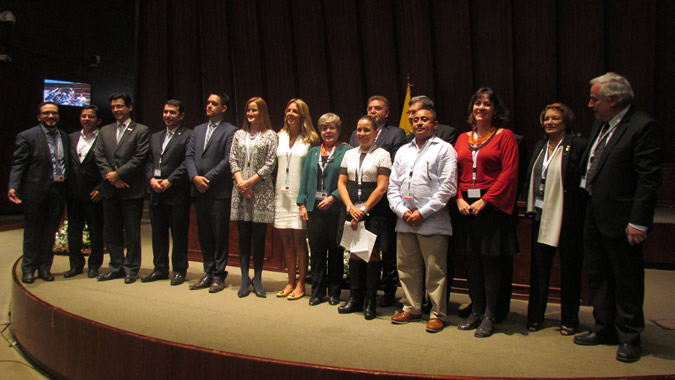ECLAC Offers Ministers of Housing Support for the Implementation of the New Urban Agenda
Work area(s)
Topic(s)
During the Habitat III Conference, Alicia Bárcena, Executive Secretary of ECLAC, attended a meeting of the Forum of Ministers and High-level Authorities of the Housing and Urban Development Sector in Latin America and the Caribbean (MINURVI).

Attending the Habitat III Conference in Quito, the Economic Commission for Latin America and the Caribbean (ECLAC), alongside UN-Habitat and MINURVI, delivered a methodological proposal for developing a regional action plan to implement the New Urban Agenda and invited the Ministers of Housing and Urban Development to join the newly established Forum of the Countries of Latin America and the Caribbean on Sustainable Development, the regional mechanism for follow-up to the 2030 Agenda.
This invitation was issued by Alicia Bárcena, Executive Secretary of ECLAC, at a meeting of the Forum of Ministers and High-level Authorities of the Housing and Urban Development Sector in Latin America and the Caribbean (MINURVI) held on Tuesday 18 October in the framework of the United Nations Conference on Housing and Sustainable Urban Development.
Statements were also made at the meeting by Elkin Velasquez, Regional Director of UN-Habitat; Soledad Núñez, Minister of the National Secretariat for Housing and Habitat (SENAVITAT) of Paraguay; Rosendo Pujol, Minister of Housing and Human Settlements of Costa Rica; Carlos Barillas, Vice-Minister of Housing of Guatemala; Paloma Silva, Director General of the National Housing Commission (CONAVI) of Mexico; and Domingo Amaya, Secretary for Housing and Habitat of Argentina.
“We invite MINURVI to join the new Forum - its know-how and experience in urban development are essential for sustainable development in the region and for fulfilling both the New Urban Agenda and the 2030 Agenda for Sustainable Development. ECLAC also offers its support in setting up an observatory to monitor the implementation of the New Urban Agenda,” said Alicia Bárcena.
The Forum of the Countries of Latin America and the Caribbean, which is State-led and convened annually under the auspices of ECLAC, was established in May 2016 in Mexico, and will meet for the first time in that country in April 2017. The Forum will provide follow-up to the implementation of the 2030 Agenda, adopted in 2105 by the United Nations General Assembly, and whose 17 Goals include making human settlements more inclusive, resilient and sustainable.
Along similar lines, New Urban Agenda to be adopted in Quito will guide the efforts of the stakeholders involved over the next twenty years to achieve sustainable urban development. To this end, MINURVI, together with ECLAC and UN-Habitat, prepared a document as an input for Habitat III, which sets forth a methodological proposal for implementing the New Urban Agenda.
The publication, entitled Latin America and the Caribbean: Challenges, dilemmas and commitments of a common urban agenda, describes and analyses the main urban trends and processes in the region over the past 20 years, identifies pending and future challenges, and outlines urban policy responses to these challenges.
The report analyses eight challenges to sustainable development in the region: inequality; low productivity; labour informality; weak tax collection capacity; inadequate investment in infrastructure; lack of territorial integration; crime and poor public safety; and exposure to the impacts of climate change. It also discusses six dilemmas for urban policies, structured around the axes of equality-growth, centralization-decentralization, revenues-externalities, expansion-density, ecology-environmental services, and inhabitants-citizens.
Three key ideas emerge from the publication. First, the region must develop its production matrix in association with the development of its cities to tackle disorderly urban growth and low urban density. Second, the region’s persistent structural poverty ―related to socio-spatial segregation, marginality and lack of opportunities― must be addressed on the basis of a comprehensive analysis of habitat (transport, education, health, public spaces, etc).
Lastly, the region has undergone a major process of decentralization, in which local governments have acquired administrative capacities but in general lack adequate financial resources. Local administrations therefore need to be strengthened, as do public-private partnerships, civil society engagements and coordination between different levels of government.
The Executive Secretary was accompanied at this meeting by Ricardo Jordán, Head of the Human Settlements Unit of ECLAC, and Vera Kiss, Associate Economic Affairs Officer.
Related content
Related link(s)
Contact
Public Information Unit
- prensa@cepal.org
- (56 2) 2210 2040